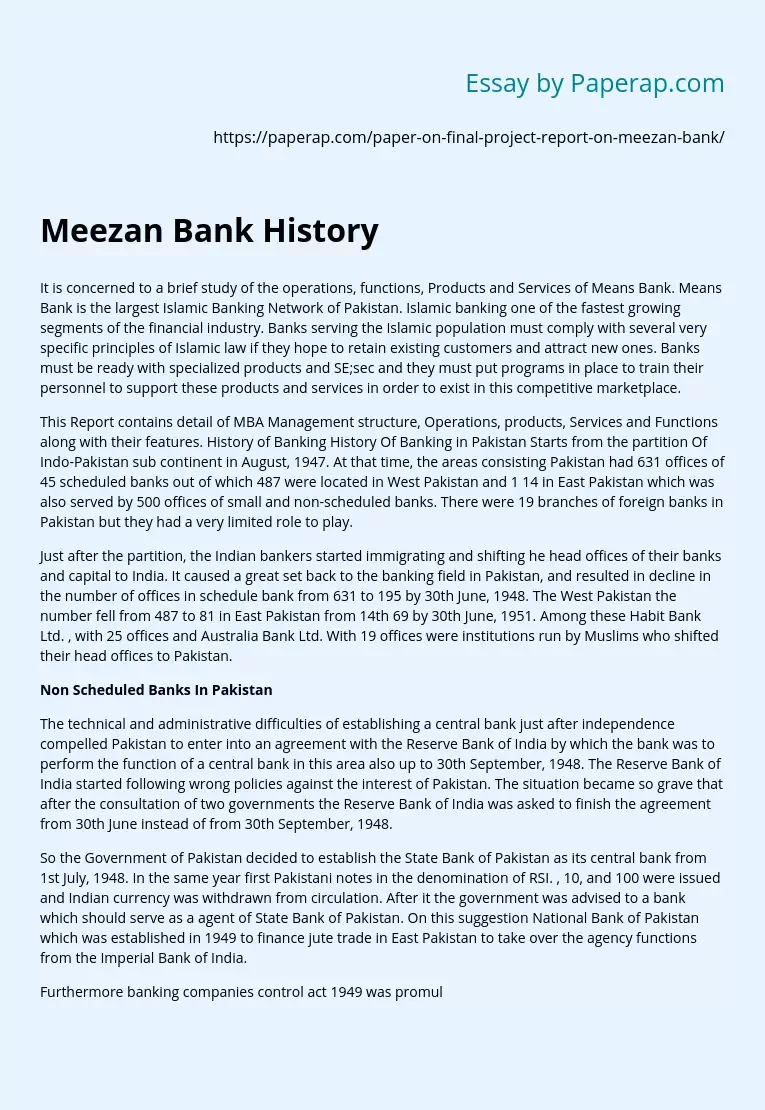Meezan Bank History
It is concerned to a brief study of the operations, functions, Products and Services of Means Bank. Means Bank is the largest Islamic Banking Network of Pakistan. Islamic banking one of the fastest growing segments of the financial industry. Banks serving the Islamic population must comply with several very specific principles of Islamic law if they hope to retain existing customers and attract new ones. Banks must be ready with specialized products and SE;sec and they must put programs in place to train their personnel to support these products and services in order to exist in this competitive marketplace.
This Report contains detail of MBA Management structure, Operations, products, Services and Functions along with their features. History of Banking History Of Banking in Pakistan Starts from the partition Of Indo-Pakistan sub continent in August, 1947. At that time, the areas consisting Pakistan had 631 offices of 45 scheduled banks out of which 487 were located in West Pakistan and 1 14 in East Pakistan which was also served by 500 offices of small and non-scheduled banks.
There were 19 branches of foreign banks in Pakistan but they had a very limited role to play.
Just after the partition, the Indian bankers started immigrating and shifting he head offices of their banks and capital to India. It caused a great set back to the banking field in Pakistan, and resulted in decline in the number of offices in schedule bank from 631 to 195 by 30th June, 1948. The West Pakistan the number fell from 487 to 81 in East Pakistan from 14th 69 by 30th June, 1951.
Among these Habit Bank Ltd. , with 25 offices and Australia Bank Ltd. With 19 offices were institutions run by Muslims who shifted their head offices to Pakistan.
Non Scheduled Banks In Pakistan
The technical and administrative difficulties of establishing a central bank just after independence compelled Pakistan to enter into an agreement with the Reserve Bank of India by which the bank was to perform the function of a central bank in this area also up to 30th September, 1948. The Reserve Bank of India started following wrong policies against the interest of Pakistan. The situation became so grave that after the consultation of two governments the Reserve Bank of India was asked to finish the agreement from 30th June instead of from 30th September, 1948.
So the Government of Pakistan decided to establish the State Bank of Pakistan as its central bank from 1st July, 1948. In the same year first Pakistani notes in the denomination of RSI. , 10, and 100 were issued and Indian currency was withdrawn from circulation. After it the government was advised to a bank which should serve as a agent of State Bank of Pakistan. On this suggestion National Bank of Pakistan which was established in 1949 to finance jute trade in East Pakistan to take over the agency functions from the Imperial Bank of India.
Furthermore banking companies control act 1949 was promulgated which empowered the State Bank of Pakistan to control the operation of other banks. To boost the economic development the State Bank of Pakistan encourage the commercial inks and gave them schemes to advance in the agricultural and industrial fields. In addition to this specialize financial. Institutions were set up to meet the acute shortage of funds in these fields. The State Bank of Pakistanis policy encouraged expansion in established banks, establishment of new banks, and weeding out Of unsound banks just to faster the growth of banking system in the country.
Meezan Bank History. (2019, Dec 05). Retrieved from https://paperap.com/paper-on-final-project-report-on-meezan-bank/

